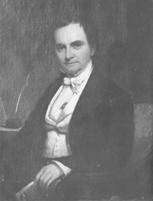William Henry Haywood
William Henry Haywood Jr. (* 23. October 1801 in Raleigh , North Carolina ; † 7. October 1852 ) was an American politician of the Democratic Party , of the State of North Carolina in the US Senate represented.
William Haywood came from a prominent North Carolina family. He attended the Raleigh Male Academy , a private school, and graduated from the University of North Carolina at Chapel Hill in 1819 . In 1821 he was employed as the first clerk at Christ Church , where he was entrusted with the supervision of the sacristy. He also studied law , was inducted into the bar in 1822, and began practicing in Raleigh.
Haywood held his first political mandate in 1831 as a member of the House of Representatives from North Carolina . He belonged to this parliamentary chamber again between 1834 and 1836, where he acted as its speaker last year . US President Martin Van Buren wanted to appoint him Chargé d'Affaires in Belgium , but he renounced this post. In 1842 he was elected a US Senator by the North Carolina General Assembly . He took his mandate in Washington, DC from March 4, 1843 and remained in Congress until July 25, 1846 . That day he resigned after refusing to represent his state parliament in a Senate vote on a tariff issue. At the time he had been chairman of the trade committee . In its place, the elected General Assembly the Whig George Edmund Badger senator.
Haywood then went back to his legal practice in Raleigh, where he died on October 7, 1852. He was buried in the Old City Cemetery there.
Web links
- William Henry Haywood in the Biographical Directory of the United States Congress (English)
- William Henry Haywood in database Find a Grave (English)
| personal data | |
|---|---|
| SURNAME | Haywood, William Henry |
| ALTERNATIVE NAMES | Haywood, William Henry Junior (full name) |
| BRIEF DESCRIPTION | American politician |
| DATE OF BIRTH | October 23, 1801 |
| PLACE OF BIRTH | Raleigh , North Carolina |
| DATE OF DEATH | October 7, 1852 |
| Place of death | Raleigh , North Carolina |

